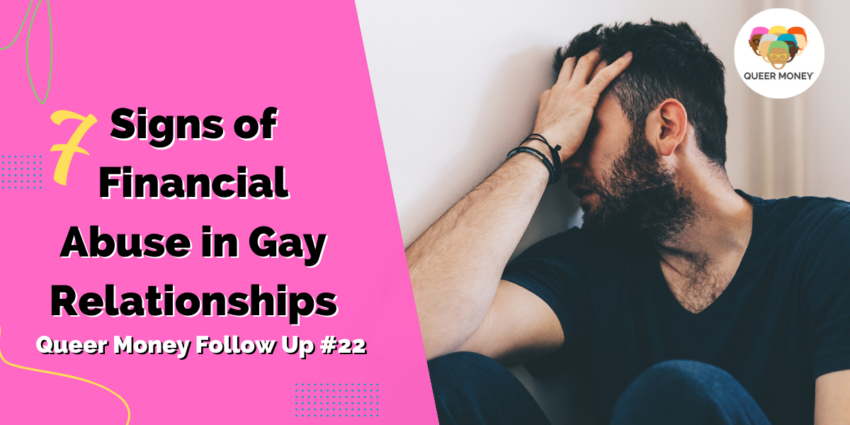Domestic and financial abuse in gay relationships
Domestic and financial abuse within gay relationships mirrors the prevalence seen in heterosexual relationships, with cases surging amid the pandemic. Recognizing the signs of such abuse is crucial. Here’s a guide to identifying and addressing domestic and financial abuse within LGBTQ+ relationships.
Signs of domestic and financial abuse in gay relationships:
Signs of domestic and financial abuse in gay relationships
Is domestic abuse more or less common in the queer community?
Domestic abuse within the LGBTQ community remains largely unaddressed. In Episode 22 of Queer Money®, Brynne Conroy from Femme Frugality joins us to shed light on this pressing issue. Despite hesitations stemming from concerns about heightened scrutiny, we must confront the reality of domestic abuse within our community. Silence only perpetuates the problem and denies victims the support they urgently need.
Domestic violence, defined here as physical violence, stalking or rape effects:
- 26% of gay men
- 37% of bisexual men
- 44% of lesbian women
- 61% of bisexual women
It’s alarming that fewer than 5% of LGBTQ individuals experiencing domestic violence pursue protective measures against their abusive partners. While physical violence, stalking, and sexual assault are commonly recognized forms of abuse, it’s crucial to acknowledge that emotional, verbal, and financial abuse are equally harmful and pervasive.
During our discussion with Brynne, we delved into the topic of financial abuse, which often flies under the radar despite its damaging effects. This insidious form of abuse is frequently dismissed with excuses like “managing money isn’t a woman’s responsibility” or “the breadwinner should handle all financial matters.” These misconceptions only serve to perpetuate the cycle of abuse and must be challenged.
7 signs of domestic and financial abuse in gay relationships are:
- Gives you an allowance or budgets without your input
- Blocks you from accounts, including your own
- Monitors your spending more to control you than manage the money
- Applies for debt or other financial products in your name
- Sabotages your career or ability to earn an income
- Makes you pay for their lifestyle – pays for the roof over their head, the food on their table, the clothes on their back
- Steals your money
In addition to the barrier of avoiding discussion about domestic abuse within the LGBTQ community to protect its reputation, another significant challenge arises from the nature of available resources. Many support organizations catering to domestic violence victims have religious affiliations, which can pose obstacles for LGBTQ individuals seeking assistance. Unfortunately, these organizations often fail to provide adequate, affirming support to LGBTQ victims, instead offering denial or insufficient aid.
Furthermore, some may even advocate for conversion therapy, erroneously suggesting that denying one’s sexual orientation or gender identity is necessary for “salvation.” Such practices not only exacerbate the trauma experienced by LGBTQ victims but also perpetuate harmful and discriminatory beliefs.
Where can LGBTQ folks of domestic abuse turn for adequate and affirming help:
- National Domestic Violence Hotline: 800-799-SAFE (7233)
- National Coalition Against Domestic Violence: https://www.thehotline.org/
Domestic violence in the queer community
According to the Human Rights Campaign, drawing from data from the National Violence Against Women Survey, alarming statistics shed light on the prevalence of intimate partner violence within same-sex relationships. Among women who have cohabited with a female partner, a staggering 39.2 percent reported experiencing rape, physical assault, or stalking by an intimate partner, compared to 21.7 percent of women who have only cohabited with men.
Similarly, among men who have cohabited with same-sex partners, 23.1 percent reported experiencing such violence, in contrast to 7.4 percent of men who have only cohabited with women. These figures underscore the urgent need for awareness and support within the LGBTQ community to address the issue of intimate partner violence.
The obscurity of domestic violence
While we commonly associate domestic abuse with physical or sexual violence, there’s a nuanced and often hidden dimension to it. Emotional manipulation, such as gaslighting and subtle forms of coercion to align with the abuser’s viewpoints, are insidious tactics that can mark the onset of domestic violence. Additionally, financial abuse, which strips victims of economic autonomy, is another prevalent form of abuse.
Given our expertise in personal finance and the profound impact of financial abuse, we and Brynne extensively delve into this aspect of domestic violence. Studies conducted by the National Coalition Against Domestic Violence reveal that financial abuse is present in between 94% and 99% of all abuse cases. This underscores the urgency of addressing this overlooked facet of domestic abuse and providing avenues for recourse and support.
Talk with a domestic abuse counselor
As we emphasized both here and on the show, while our expertise lies in personal finance, we acknowledge the gravity of domestic violence and the importance of seeking professional help if you suspect your relationship is becoming or already is abusive. Especially if you’re considering leaving an abusive relationship, reaching out to a domestic abuse counselor is crucial.
For immediate and direct support, regardless of your gender identity, sexual orientation, or location, Brynne highly recommends contacting the National Domestic Violence Hotline at 1-800-799-7233 or 1-800-787-3224 (TTY). This hotline provides confidential assistance and resources to individuals needing support and guidance.
Watch as we dig deeper into domestic and financial abuse in gay relationships:
How can you get more Queer Money®?
✅ Get your free copy of the Queer Money® Kickstarter© here.
✅ Subscribe to Queer Money® on your favorite podcast player here.
✅ Subscribe to Queer Money® here on YouTube.
✅ Email us with questions @ [email protected]
We’re David and John Auten-Schneider, the founders of Debt Free Guys and creators of the Queer Money® podcast. We help queer people (and allies) achieve financial, relationship, time, and location freedom by helping them architect their Wealth Builder’s Pyramid.

